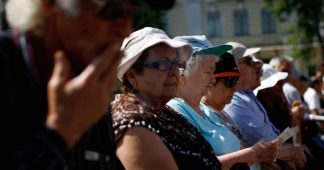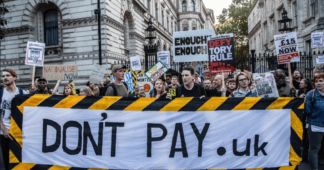By Clara Bauer-Babef
4 Nov. 2022
While stabilising energy prices and a mild early autumn have brought a welcome respite for Europeans, a new survey suggests that the crisis the continent is bracing for this winter is already here.
One in four people say they are in a precarious situation, while the majority of Europeans have already had to make difficult because of financial difficulties, a poll by French NGO Secours Populaire revealed on Friday.
Secours Populaire, the IPSOS survey institute, and their European partners surveyed 6,000 Europeans on the issue of precariousness in six countries: France, Italy, Greece, Germany, Poland, and the UK.
“There is a very strong increase in precariousness in Europe,” Secours Populaire Secretary general Henriette Steinberg told EURACTIV.
The final figures show that 51% of respondents in Greece say an unexpected expense could tip them over the edge. This number is 18% in Germany and around 20-25% in France, Italy, Poland, and the UK.
“There is a growing concern among Europeans that more and more people are unable to find viable solutions to support themselves and their families,” said Steinberg.
Most Europeans have already been confronted with complicated choices due to a difficult financial situation. Some have had to restrict travel, reduce heating, call for help from relatives, and take on additional jobs to make ends meet.
“We realised that all Europeans have the same concerns: food, health care, housing and providing for their children. This is the daily life of tens of millions of people,” Steinberg said.
Euro area annual inflation is expected to be 10.7% in October 2022, up from 9.9% in September, according to a flash estimate from Eurostat, the statistical office of the European Union.
But for some Europeans, saving money is not enough. Forty-two per cent of those surveyed have already asked their relatives to lend or give them money to support themselves.
This figure is “a warning signal”; according to Steinberg, “these people already can’t afford it”.
The rate of borrowing is highest in Greece (63%), followed by the United Kingdom, Italy, and Poland (between 40% and 41%) and France (36%) and Germany (35%).
But borrowing money is not sustainable in the long term. On the one hand, “people do not dare to ask their relatives for money, or their relatives simply cannot help them,” left-wing MP Aurélie Trouvé in the French legislative and member of the Economic Affairs Committee told EURACTIV France.
On the other hand, households are likely to take out consumer loans. But this emergency solution can be risky as interest rates increase.
“The ultimate risk would be the appearance of a financial and banking crisis, as during the subprime crisis of 2007 in the United States, if households are no longer solvent,” said Trouvé, who advocates for restoring purchasing power to the poorest households to revive growth.
“If households no longer have purchasing power, then demand is at half-mast and collapses. If demand collapses, production collapses too, and jobs with it,” the French MP said.
“It’s a vicious circle. We are heading straight for a social catastrophe,” she added.
We remind our readers that publication of articles on our site does not mean that we agree with what is written. Our policy is to publish anything which we consider of interest, so as to assist our readers in forming their opinions. Sometimes we even publish articles with which we totally disagree, since we believe it is important for our readers to be informed on as wide a spectrum of views as possible.











